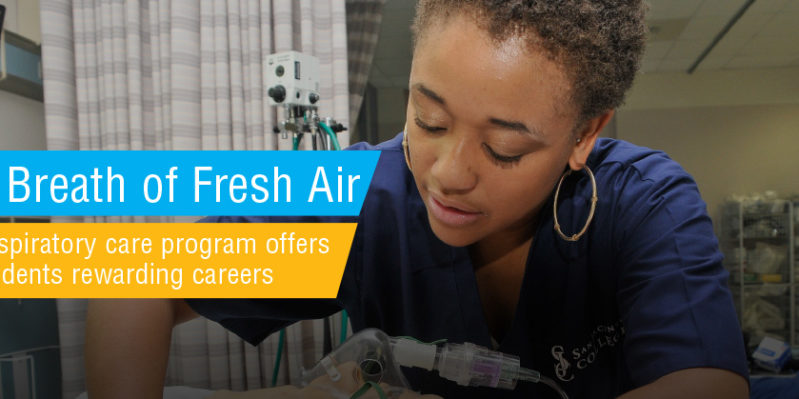
For students wanting to enter the medical field but aren’t sure where to start, San Jacinto College’s respiratory care program is a gateway to many opportunities.
Respiratory therapists provide care, through the use of diagnostic testing, to patients with abnormalities of the cardiopulmonary systems. Therapists practice their specialty under the direction of licensed physicians and perform their duties in a variety of settings, including intensive care units, neonatal/pediatric special care units, general hospital wards, emergency/trauma units, extended care facilities, and the home.
“Respiratory therapists work all over the hospital,” said Carol LaRowe, San Jacinto College respiratory care program director. “We’re with the preemies, all the way to the end of life and everything in between. We see all the different areas of the hospital while we’re doing our job.”
For 31-year-old Tony Martone, working in different areas of the medical field helped him decide to join the respiratory program. “I originally went into radiology and became a radiology tech and MRI tech,” said Martone. “I was also a certified nurse aide (CNA) for a little while and ultimately that’s what brought me to the respiratory program. I like having a therapeutic role in patient care, and this was the right fit for me.”
“A lot of our students have previously worked as a CNA, EMT, or tried nursing but decided that’s not what they wanted,” said LaRowe. “Our program has a lot of non-traditional students who are transitioning from other careers, so none are straight out of high school.”
Twenty-year-old Shacresha Randle is finishing her first semester in the program and likes the fast pace. “I’m a hands-on person, and I do well in fast-paced environments,” said Randle. “Once you’re in the field, you’ll be working with different patients all the time and doing different things.”
One thing some students don’t expect is the math. “You’re going to have to do some math, but if you have trouble understanding the formulas, your classmates are always willing to help you out,” said Martone.
“It’s not extreme math; it’s math that any college student is capable of,” added LaRowe. “If you take our formulas to the tutoring center and talk to one of the math tutors, they can help you work out the math.”
Both Martone and Randle agree that the biggest aspects of the respiratory care program are time management and the dedication you put into it. “Time management is huge,” said Randle. “There’s so much information you’re going through in class, so you need to take time on your own to go over things making sure you understand everything.”
“You’re going to make sacrifices to succeed in the program, but it’s all going to pay off,” said Martone. “Two years is a drop in the bucket for a career that’s interesting that can make you a decent living. You’re almost like a family. You want everyone to do well and you’re all there to support each other. There’s really a camaraderie there that you don’t find in a lot of other programs.”
The San Jacinto College respiratory care program offers an associate of applied science degree upon completion. Graduates are qualified to apply to take the examination for entry-level Certified Respiratory Therapist as well as the advanced Registered Respiratory Therapist examination administered by the National Board for Respiratory Care. According to the U.S. Bureau of Labor Statistics, respiratory therapists in Texas can earn an average of $55,130 annually.
Andrea Vasquez


